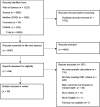Internet-delivered cognitive behaviour therapy for affective disorders, anxiety disorders and somatic conditions: An updated systematic umbrella review
- PMID: 39381818
- PMCID: PMC11459498
- DOI: 10.1177/20552076241287643
Internet-delivered cognitive behaviour therapy for affective disorders, anxiety disorders and somatic conditions: An updated systematic umbrella review
Abstract
Background: Internet-delivered cognitive behaviour therapy (ICBT), which can involve guidance from a clinician, continues to be a way to deliver psychological treatments. A previous umbrella review identified moderate-to-large effect sizes favouring ICBT compared to control conditions when treating major depression and anxiety disorders. Given the rapid developments in the field, an updated umbrella review of available meta-analyses can show other conditions and subpopulations for which ICBT is effective. The aim of the study was to provide an expanded overview of the efficacy of ICBT for a broader range of adult psychiatric and somatic conditions.
Methods: We conducted an updated search of the literature since the publication of the previous umbrella review back in 2019 and up until March 2024. Five different search engines were used (Medline (OVID), Scopus, Web of Science, Cochrane library and CINAHL). The search was expanded to include additional psychiatric conditions (e.g., suicidal ideation) and somatic conditions (e.g., tinnitus and chronic pain).
Results: Of the 6509 identified articles, 39 meta-analyses met the inclusion criteria. In these meta-analyses 19 unique outcomes were represented. The most common outcome was symptoms of major depressive disorder, followed by symptoms of anxiety. Effect sizes for the comparisons against control conditions ranged between small (e.g., SMD = 0.10 for stress in employees) to large (e.g., SMD = 1.20 for depressive symptoms among older adults).
Conclusions: ICBT can generally reduce symptoms of a wide range of conditions including both psychiatric and somatic conditions, as well as other mental health problems. This updated review of available meta-analyses also indicated that ICBT has been successful in treating symptoms in different subpopulations such as older adults and students. However, some knowledge gaps remain, including the use of ICBT for psychotic disorders, and the quality of the available meta-analyses' points to a need for more stringent methodological procedures.
Keywords: ICBT; cognitive behaviour therapy; eHealth; internet intervention; psychiatric disorders; somatic disorders.
© The Author(s) 2024.
Conflict of interest statement
The authors declared no potential conflicts of interest with respect to the research, authorship and/or publication of this article.
Similar articles
-
Internet-Delivered Cognitive Behavioural Therapy for Major Depression and Anxiety Disorders: A Health Technology Assessment.Ont Health Technol Assess Ser. 2019 Feb 19;19(6):1-199. eCollection 2019. Ont Health Technol Assess Ser. 2019. PMID: 30873251 Free PMC article.
-
Behavioural modification interventions for medically unexplained symptoms in primary care: systematic reviews and economic evaluation.Health Technol Assess. 2020 Sep;24(46):1-490. doi: 10.3310/hta24460. Health Technol Assess. 2020. PMID: 32975190 Free PMC article.
-
Long-Term Efficacy of Internet-Based Cognitive Behavioral Therapy Self-Help Programs for Adults With Depression: Systematic Review and Meta-Analysis of Randomized Controlled Trials.JMIR Ment Health. 2023 Aug 22;10:e46925. doi: 10.2196/46925. JMIR Ment Health. 2023. PMID: 37606990 Free PMC article. Review.
-
Internet-based cognitive behavioral therapy for patients with chronic somatic conditions: a meta-analytic review.J Med Internet Res. 2014 Mar 27;16(3):e88. doi: 10.2196/jmir.2777. J Med Internet Res. 2014. PMID: 24675372 Free PMC article. Review.
-
The Effectiveness of Internet-Based Cognitive Behavioral Therapy as a Preventive Intervention in the Workplace to Improve Work Engagement and Psychological Outcomes: Protocol for a Systematic Review and Meta-analysis.JMIR Res Protoc. 2023 Jan 19;12:e38597. doi: 10.2196/38597. JMIR Res Protoc. 2023. PMID: 36656635 Free PMC article.
Cited by
-
Digital intervention for tokophobia: a randomized controlled trial of internet-based cognitive behavioral therapy on fear of childbirth and self-efficacy among Egyptian pregnant women.BMC Pregnancy Childbirth. 2025 Mar 3;25(1):233. doi: 10.1186/s12884-025-07341-5. BMC Pregnancy Childbirth. 2025. PMID: 40033245 Free PMC article. Clinical Trial.
References
-
- Thoma N, Pilecki B, McKay D. Contemporary cognitive behavior therapy: a review of theory, history, and evidence. Psychodyn Psychiatry 2015; 43: 423–461. - PubMed
-
- Cuijpers P, Berking M, Andersson G, et al. A meta-analysis of cognitive-behavioural therapy for adult depression: alone and in comparison with other treatments. Can. J. Psychiatry 2013; 58: 376–385. - PubMed
-
- van Straten A, van der Zweerde T, Kleiboer A, et al. Cognitive and behavioral therapies in the treatment of insomnia: a meta-analysis. Sleep Med Rev 2018; 38: 3–16. - PubMed
Publication types
LinkOut - more resources
Full Text Sources
Miscellaneous


